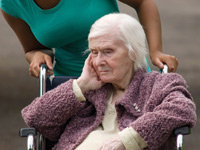
The number of applications by care providers to detain people who lack capacity is one-third the level expected since safeguards were introduced to ensure detentions were conducted lawfully.
There has also been a wide disparity in the number of applications for deprivation of liberty safeguards (Dols) received by local authorities from April 2009, when they came into force, to October, with two councils having made none.
The figures were revealed at a Community Care conference on safeguarding vulnerable adults yesterday.
Under regulations, hospitals and care homes must seek authorisation from primary care trusts or councils to detain people who lack capacity for treatment or care.
Least restrictive regimes
The safeguards are designed to ensure deprivations of liberty are made in the person’s best interests and involve the least restrictive regimes.
Paul Gantley, national programme implementation manager for the Mental Capacity Act 2005 at the Department of Health, told the conference there had been 4,068 safeguards applied for since April.
While applications had been far lower than expected 38% had been authorised, compared with a DH assumption that only one in four would be granted.
Local authorities dealt with three quarters of applications.
Gantley attributed the higher-than-expected proportion of authorised cases to the training that the DH, councils and PCTs had conducted with providers, resulting in fewer unnecessary cases than expected.
Lack of checks
The safeguards were introduced after the European Court of Human Rights ruled in 2004 that a severely autistic man, known as HL, had been unlawfully detained at Bournewood Hospital in 1997, because of the lack of checks on detention.
One of HL’s carers, who have campaigned on the issue ever since, said that relatives were unable to bring pressure to bear on care homes to use the safeguards.
He said: “There’s a definite lack of awareness for members of the public whose relatives may be affected by this. There was no information put out for the carers or families.”
“Complicated legislation”
Gantley said he expected the number of cases to rise in the future. “It’s a very complicated piece of legislation that people are going to need some time to understand.”
He added that the two authorities that have had no cases had still been active in promoting the safeguards. “They have both provided us with evidence of activity to train and raise awareness. They and others with lower than expected numbers would argue that they are victims of their own success.”
By contrast one other local authority has so far dealt with 185 cases.
Related articles
DH renews warnings over access to mental capacity advocacy
Councils and health bodies ‘failing vulnerable people’
More information


 Bournemouth, Christchurch and Poole
Bournemouth, Christchurch and Poole  Hampshire County Council
Hampshire County Council  Lincolnshire County Council
Lincolnshire County Council  Norfolk County Council
Norfolk County Council  Northamptonshire Children’s Trust
Northamptonshire Children’s Trust  South Gloucestershire Council
South Gloucestershire Council  Wiltshire Council
Wiltshire Council  Wokingham Borough Council
Wokingham Borough Council  Children and young people with SEND are ‘valued and prioritised’ in Wiltshire, find inspectors
Children and young people with SEND are ‘valued and prioritised’ in Wiltshire, find inspectors  How specialist refugee teams benefit young people and social workers
How specialist refugee teams benefit young people and social workers  Podcast: returning to social work after becoming a first-time parent
Podcast: returning to social work after becoming a first-time parent  Podcast: would you work for an inadequate-rated service?
Podcast: would you work for an inadequate-rated service?  Family help: one local authority’s experience of the model
Family help: one local authority’s experience of the model  Workforce Insights – showcasing a selection of the sector’s top recruiters
Workforce Insights – showcasing a selection of the sector’s top recruiters 

 Facebook
Facebook X
X LinkedIn
LinkedIn Instagram
Instagram
Comments are closed.